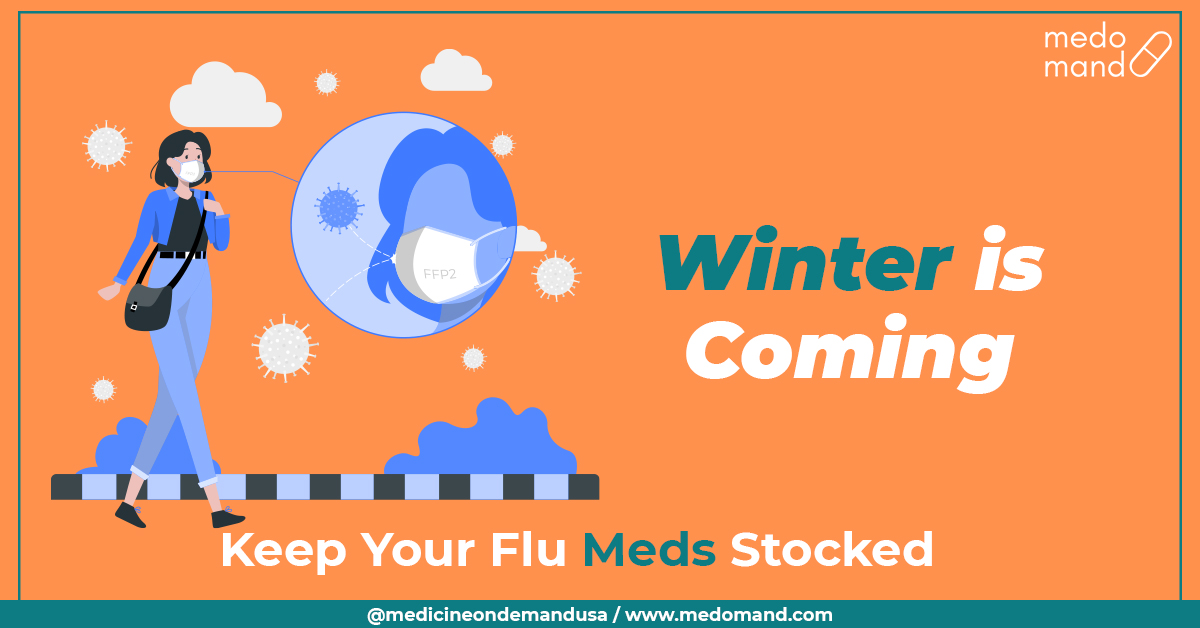Most people associate cold weather with the common cold and flu. With the advent of the chilly season, many of you cannot seem to get away from sneezing, coughing, scratchy throat, and runny nose. Everyone knows these are the first signs of a cold. Millions of people catch a common cold and flu every year in the United States.
The weather is not directly responsible for making you sick, and the viruses that cause cold may spread more easily in lower temperatures. Also, exposure to dry and cold air may negatively impact the immune system of the body.
Why are You More Prone to Cold in Winter?
Cold Thrives in Winter
Somehow the flu virus thrives in the cold. In the US, flu activity is at its peak during the winters. Besides, in the southern hemisphere, the virus packs its most unpleasant punch during American summer, which is when the winters are going on in that part of the world.
It turns out that the virus is designed to hop from person to person in dry and cold air. Research shows that transmission rates are highest when humidity and temperature are low. Since cold air holds less amount of water, low humidity comes with wintertime.
Moreover, some key factors are also involved, such as cold air, which may help the virus to survive outside of the host and make it easier to stay put after a sneeze or cough. Also, the virus is great at circulating in low humidity. When the infected person exhales the virus entrapped in a tiny water droplet, the water evaporates quickly as the air is dry. The flu droplet shrinks quickly, becoming light, making it easier to circulate in the air rather than falling on the ground.
Spending More Time Inside
You are more likely to get sick as you are spending most of your time indoors. It means you are close to other people physically, more often breathing the same circulated air. Schools and offices are especially more hazardous. Studies have shown that just a single pathogen present on a single doorknob can infiltrate an entire building in just a few hours. The break room surfaces are more vulnerable to virus’ spread.
It would help if you were mindful of what you are touching. Practice hand washing, use sanitizers between touching potential germy things and touching your food or face.
Cold Makes You More Vulnerable to Illness
Furthermore, dry, cold air leaves mucus membrane in coarse condition. This is the reason respiratory illnesses are common in the cold season. Mucus membrane coats your respiratory system to protect it from pathogens. And the cold air dries the beneficial mucus layer.
Seasonal changes cause various allergies to flare up as you are exposed to a variety of pollens. When your throat is itchy and your nose runs, your mucus membranes are vulnerable and irritated, making it easier for a devious virus to take shelter there. Apart from that, tenacious allergies can result in secondary bacterial infections in your sinuses or throats.
The Immune Affect
The cold weather can also affect the immune system of your body as it weakens the defense against infection. The longer nights and shorter winters mean less sunlight, hence less Vitamin D. vitamin D empowers the immune system, and thus, it makes you more vulnerable to infection.
Besides, the cold virus transmits faster in the wintertime. Low temperature makes its coating made of lipid strong and tough, and thus, it gets more active and resilient.
Most importantly, breathing in dry and cold air makes the blood vessels narrow in the upper respiratory tract to conserve heat. It prevents white blood cells from outreaching the mucus membrane. So it gets difficult for the body to fight against pathogens.
Symptoms of Cold
The symptoms usually appear after one to three days of exposure to a cold-causing virus. Though symptoms may vary individual to individual, more or less they are common, that might include:
- Congestion
- Cough
- Sore throat
- Stuffy or runny nose
- Sneezing
- Mild headache
- Low-grade fever
- Slight body aches
- Weakness
As the common cold runs its course, your nose discharge may become thicker and green or yellow.
When your symptoms intensify or fail to improve for quite a time, you must visit a doctor immediately. For instance, if your fever increases, you experience shortness of breath, unusual drowsiness, or loss of appetite, among others.
How to Prevent Cold?
You must take the following commonsense precautions to stop or reduce the rate of spread of the cold virus.
Wash your hands regularly
You must thoroughly wash your hands with water and soap for at least twenty seconds. If they are not available, then use alcohol-based hand sanitizer that contains at least sixty percent alcohol. Avoid touching your mouth, eyes, or nose with unwashed hands.
Cover your mouth while coughing
Cough or sneeze into tissues and throw away the used ones right away. After that, wash your hands. If you don’t have tissues, then cough or sneeze into the elbow bend, followed by washing hands.
Disinfect your things
Disinfect and clean high-touch surfaces such as light switches, doorknobs, kitchen countertops, and electronics daily. It is especially essential if someone in your family is suffering from the infection. Besides, wash your kid’s toys at regular intervals.
Stay away from infected people
Avoid any kind of close contact with the person infected with a cold virus. Avoid going into the crowds whenever possible.
Do not share
Do not share eating utensils or drinking glasses with other family members. Use your disposable cups and glass when someone else or you are sick. You can label or mark the glasses with the names of the person who are using them.
Maintain healthy lifestyle
Take care of yourself. Exercise regularly, eat a healthy balanced diet and get enough sleep for your overall good health and well-being.
Conclusion
The winter season makes you more prone to catch a bad cold, and chilly weather means you spend more time inside, where viruses are lingered on the surfaces you touch and in the air. Besides, a drop in temperatures leaves your mucus irritated, dry, and vulnerable to various infections weakening your body’s immune system.
So, follow the practices mentioned above to prevent cold, and if your symptoms are not improving or getting worse, do see a doctor as soon as you can.
Disclaimer: The information contained in this article is for educational and informational purposes only and should not be relied upon for any diagnostic or medical purpose or the treatment of any symptom or condition.

